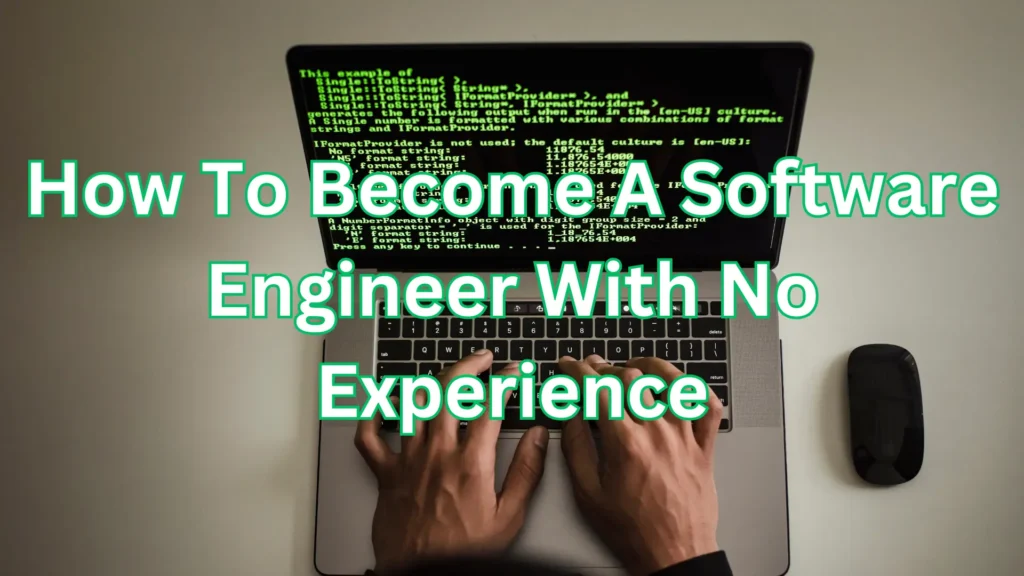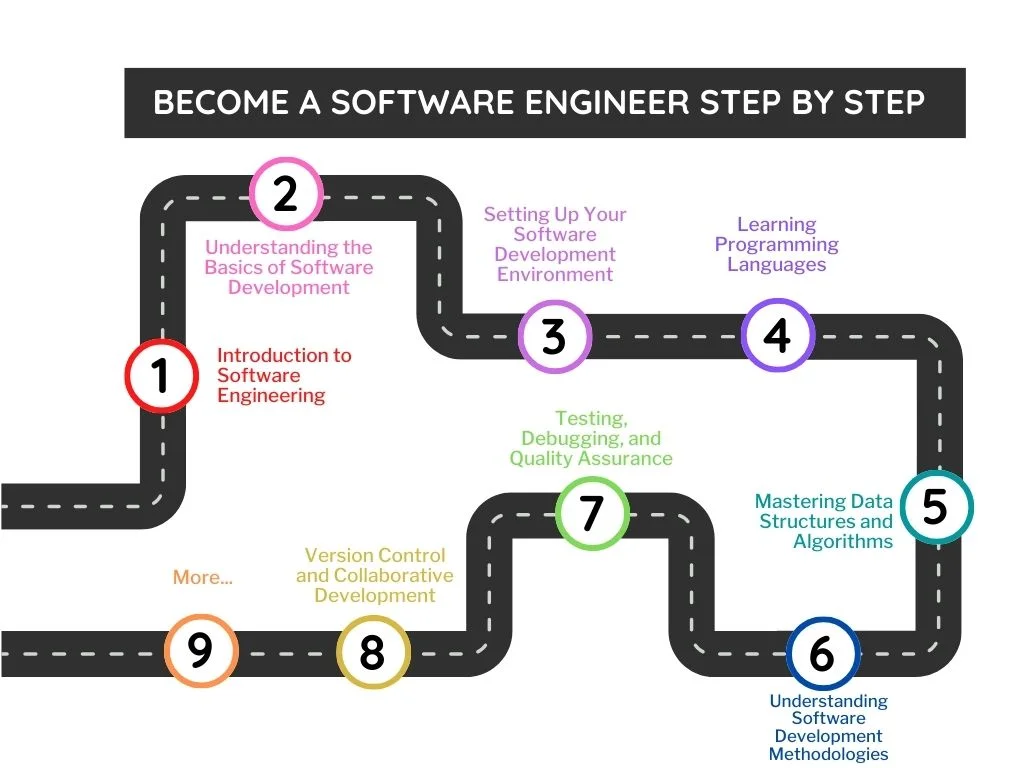How to Become a Software Engineer with No Experience in 2025
What it Takes to Become a Software Engineer
If you’re wondering how to become a software engineer with no experience considering all the jobs require degrees and degrees are quite costly; well, guess what? It’s still absolutely achievable. Certainly, if you have reached this point, there is no doubt that you’re a tech-lover willing to scale tons of money with flexible work that also gives great satisfaction. The good thing here is that to be employed as a software engineer, particularly as a junior software engineer, one does not need to be a computer expert with a computer engineering degree or work experience. One of the necessities required to overcome the barriers includes; determination, to achieve a roadmap, and strategic planning. And that is pretty much what we are going to discuss in today’s topic,
So let’s get into the nuts and bolts of how to become a software engineer without experience, what hurdles will be on your way, and how to bypass them.

1. How to Become a Software Engineer With No Experience
First, before anything else, know who a software engineer really is and what they do in the first place. This understanding would lay the groundwork for creating an effective roadmap to becoming one and knowing what you’re getting yourself into. In other words, a software engineer codes and is also supposed to modify the computer programs to ensure they function properly. This could include anything from web applications to smartphone applications or right down to basics such as operating system applications such as network protocols.
As an entry level software engineer, you will write code, fix issues that were previously coded, test, and coordinate with other groups to design functional software. Specifically the role will vary depending on your niche but the day-to-day of software engineering is problem-solving with code.
2. How Long It Takes to Become a Software Engineer
It’s completely natural to think about: “How long it takes to become a software engineer?” The timeline is flexible and is not the same for everyone in all honesty. But if you are a complete newbie who is just beginning and who does not have any programming experience at all, you could take anywhere between half a year to two years to get to the level where you can actually design a simple web application. It is not a hasty thing, but you really need to have command over all the fundamental skills.
Here’s a rough timeline for self-taught learners:
- Months 1-3: Concentrate on studying the concepts of programming as a first language (e.g., Python, Java, JavaScript). Choose one language and go further.
- Months 4-6: Start with creating small projects and practice using version control systems such as Git, Github, etc.
- Months 7-12: Get to know data structures and algorithms—do not underestimate these when preparing for an interview.
- Months 12-18: If proceeding with the software engineer – core networking, then you may begin working on more complex subjects including networking or system design.
- Months 18-24: Look for entry-level software engineer jobs, continue to build your résumé with projects, and begin submitting applications.
This is not a strictly followed timeline – it depends on how you want to manage your time and how diligent you are about learning.
3. How Difficult is it to Become a software engineer?
Now, let’s look at the bigger picture: How difficult is it to become a software engineer?
If we’re being blunt, getting a job as a software engineer is not an easy endeavor. You will introduce yourself to new programming languages, and abstract notions such as an algorithm, and bear the patience to solve intricate problems. However, the problem can be solved if one agrees to take baby steps and be dedicated to practicing them. Let me remind you that it is not mandatory to possess comprehensive knowledge to get a job. The knowledge requirement is not very high – you only need to know enough to solve the problems companies have.
Here are three practical tips to make the journey less daunting:
- Choose One Programming Language: Do not try to take more than one language course at a time; it is far better to immerse yourself in one language at a time. Python is preferred by new learners while JavaScript is also widely used.
- Build Projects Early: Don’t wait until you are an expert to start building. Start making simple apps, websites, or tools at once when you are through the basics. This will help to retain the motivation and provide an opportunity to gain some experience.
- Join a Coding Community: The company and support of other learners or professionals can be quite helpful. Join coding forums, Discord channels, or coding bootcamps.
4. Step-by-Step Outline to Becoming a Software Engineer with No Experience
Now that we have given you an outline, let’s guide you through the process of aspiring to be a software engineer from ground zero without any experience.

Step 1: Familiarizing with the Fundamentals of Programming
The first step is to understand how to write code. To those who are first-time learners in programming, I would recommend that you should start learning python programming because it is easy to understand. Another excellent language you can learn if you are interested in web development is JavaScript.
To get started, use free resources like:
- Codecademy (coding lessons with an emphasis on active practice)
- GitHub (the core platform for repository housing)
- CS50’s Introduction to Computer Science by Harvard (better, more detailed)
Step 2: Build Your First Projects
After you are conversant with a programming language, it is advised that you develop small projects as a way of enhancing the knowledge acquired. Consider a project of your choice right now—be it an application that predicts the weather, an online diary, or a basic reminder list. The more you build, the more you will become confident. Also, having tangible projects will be important when applying for jobs down the line.
Step 3: Understand Data Structures and Algorithms
If you are aspiring to be an entry-level software engineer, data structures and algorithms should be something familiar to you. This has to be one of the most frequently asked questions you come across when attending software engineering interviews.
Great resources for mastering this are:
- LeetCode (for practiced problems)
- Cracking the Coding Interview by Gayle Laakmann McDowell
- HackerRank (actual contests focused on coding)
Step 4: Software Engineer – Core Networking: Networking and System Design
If for instance, you want to be a core networking coder or back-end coder, then it would in your own best interest to learn some of the most used protocols in networking, how systems are architected, and how computers are able to communicate on a network.
Resources:
- Computer Networking: A Top-Down Approach by Kurose and Ross
- Networking for Web Developers channel on YouTube
- Grokking the System Design Interview by Design Gurus
Step 5: Build a Portfolio and GitHub Repository
After getting used to the construction of some projects, find ways to categorize the documentation in an online portfolio or the repositories of GitHub. This will be used as your documented record of your achievements when seeking employment. It is also important to accentuate projects that would certainly prove your understanding of different technologies.
Portfolio Tips:
- Include a short description of each project and the tools or technologies you used.
- Use GitHub to host your projects and showcase your version control skills.
- Highlight relevant projects that align with job descriptions in your target roles.
Step 6: Look for Entry-Level Software Engineer Jobs
Now, there is the exciting part – getting a job! As you begin your search for entry-level software engineer jobs, remember that employers are not necessarily concerned with the amount of experience you have. They want to get an idea of the applicant’s capability to write clean code, debug as well as make sound decisions.
Tailor your resume to emphasize:
- Personal projects
- Problem-solving abilities
- Any previous freelance or intern job
- Open-source project tasks
Moreover, don’t shy away from networking! Most jobs with low entry levels are many times offered through connection rather than through a company’s post on job forums. Go to meetups, use LinkedIn, or try hackathons.
5. Common Challenges and How to Overcome Them
Challenge #1: Self-Doubt and Imposter Syndrome
Many new learners face self-doubt, especially when they hit a roadblock. Remember, every software engineer was once a beginner. Focus on incremental progress and celebrate small wins to build confidence.
Challenge #2: Staying Consistent
Staying committed is critical. Use study schedules or accountability groups to keep yourself on track. Coding bootcamps and online communities can help you stay motivated.
Challenge #3: Choosing the Right Resources
Due to the flood of information available it is easy to be bogged down by this. Initially, limit yourself to a couple of reliable sites found in the list given above. When you are familiar with what is available, you can delve deeper into the more specific area.
The Takeaway on How to Become a Software Engineer With No Experience
Well, that concludes it – this is your ultimate manual on the process of how to become a software engineer with no experience. Even if the path may seem long the journey is full of chances to gain knowledge, develop, and succeed. Providing time, effort, money, and a positive spirit, one can become a software engineer from a beginner in just a few months.
The IT industry is progressing as time passes, and employers are in constant search of new and talented employees. Whether it is the network you lean towards, web development, or mobile applications, it is important that you immerse yourself now and build your way toward becoming a software engineer. You’ve got this – time to embark on a coding journey!